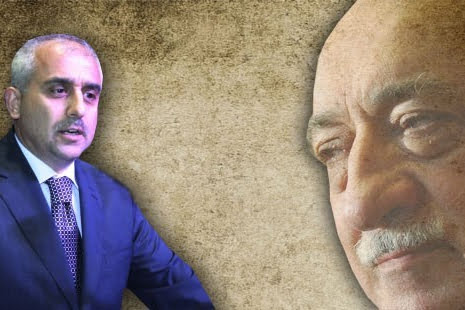Turkey has not achieved enough democratization for Fethullah Gülen’s return

Date posted: May 28, 2013
Kenan Taş
Mustafa Yesil: “The possible tension between the ruling Justice and Development Party (AK Party) and the Gülen movement is what the pro-guardianship figures desire most. Moreover, it should be recalled how satisfied they were during the constitutional and presidential election crises in 2007 and the AK Party closure case in 2008. Turkey is passing through historically important days, and all of its social and political players have great responsibilities during this period.”
The Gülen movement is one of the world’s most prominent social movements, regardless of what you call it: cemaat (religious community), Hizmet, or camia (social community). And yet it remains a black box for people who do not know it, who wonder about its goals and motivations, about whether it has a secret agenda. As a result, the movement feels the need to expound on its views.
Although the Journalists and Writers Foundation keeps pointing out that it is not a spokesperson for the Gülen movement, everything it publishes or releases is considered to be the movement’s official view. The foundation has therefore become kind of an institutional face of the movement. The foundation recently launched a website, “Questions to Hizmet,” that answers the questions/concerns raised about the movement. Today our guest is Mustafa Yesil, president of the Journalists and Writers Foundation.
Let’s start with the “Questions to the Hizmet” website. Why did the movement see a need for it, and what is its goal?
From Hizmet’s earliest days, people from different backgrounds raised questions about the movement and received answers either via written statements or verbally. We decided to provide easy public access to this accumulated knowledge. This would also eliminate any rumors and misinformation about its activities. Moreover, we learned a lot while working on these questions. We realized that people included their gratitude toward the movement in their questions. Finally, we were able to stay more up-to-date on what people really want to know.
Mr. Yesil, some people think that the movement is not transparent enough. Do you agree with this sentiment?
I’m aware of that, but I don’t think it is true. Nevertheless, we are trying to understand the elements causing this misconception. We are living in the same society, and thus the same rules apply to all of us. Unless this charge is proven by the country’s legal framework, it is not fair to accuse somebody of not being transparent. Furthermore, I want to emphasize a few points: First of all, the term transparency is often misused. One should think carefully before confronting a group with such a claim. As a matter of fact, when the accusers are asked to describe what they find non-transparent, it becomes clear that they mean different things. They have a certain view of the movement in their imagination, and when they realize that it does not match the reality they start to accuse the movement of not being transparent.
Turkey has gone through a strong guardianship era and is still under the reflections of that era. Considering this, you can understand that not only the Gülen movement but also any civil society organization found it difficult to express its views freely. Even their supporters have been questioned or investigated because of their support. Just like any civil society organization, the Gülen movement also wishes to express its views and explain its activities to the general public. In fact, the movement will acquire new supporters only if it can successfully explain all of its domestic and foreign activities to the general public.
Transparency of a civil society organization brings to mind a number of characteristic features, including its principles and guidelines, management style, endowment, voluntary resources, and availability to the public. Hizmet has not only made statements to clarify such issues, but has also invited and hosted visitors at related institutions to reflect its sincerity. In addition, Hizmet has been the subject of many academic studies. We do not forget that a civil society organization that relies on the people’s trust functions because of its transparency and its volunteers’ contributions. Any opacity would cause the loss of support and, subsequently, the public’s approval.
Hizmet has never experienced such a crisis of confidence and trust during the forty years of its active existence. On the contrary, it has been growing constantly due to increasing support and confidence. There is no doubt that the reason for this support is based on its “trustworthiness.” The strange yet significant fact is that Hizmet’s transparency is questioned by its volunteers. Undoubtedly, one cannot be forced to volunteer for a movement that he/she does not trust. While volunteers reflect their confidence in Hizmet by their actions and contributions, those who assert a lack of transparency are, in fact, indicating their contempt for those volunteers.
Second, Hizmet is active in more than 100 countries. Given these countries’ diverse legal regulations and political structures, the movement would not have gone through such a globalization if it had been reluctant to be transparent. After all, we are talking about a community that is being inspected throughout the world, from Afghanistan to United States, on a daily basis. Hizmet’s main focus is education, which is regarded as a highly delicate matter by any government and society. Therefore, in a way, Hizmet has justified its credibility by being deeply involved in such a sensitive area as education. Once again, I would like to emphasize that Hizmet is being constantly scrutinized in more than 100 countries. To what other tests should it be subjected to prove its transparency?
Mr. Yesil, this community, of which you are also a part, has been called by many names, among them cemaat (community), hizmet movement, camia (social community), and Hizmet volunteers. How would you name it?
A volunteer-driven community composed of members from civil society cannot be named. In other words, a government agency cannot assign a name to such an ensemble. Therefore, the presence of multiple names is quite natural. In addition, the use of a specific name cannot be imposed. Conceptually, Hizmet is the sum of activities undertaken in the interest of others without seeking its own self-interest, for the sole purpose of solving social problems. In the past, some called it a “community.” I believe that what people call it is not important, as long as what they call it does not offend its volunteers, namely, those who strive to benefit others while making self-sacrifices throughout their lives. As volunteers, we prefer to use “Hizmet,” which evokes a collective consciousness rather than any self-ambition. Naturally, you cannot call someone “John” if he calls himself “David.” If the volunteers call this community the “Hizmet Movement,” it would only be common sense to refer to it by that word. Besides, the collective consciousness named this community “Hizmet” without any imposition by Fethullah Gülen or his close friends. It should be emphasized that many associate the word “Hizmet” directly with the movement that has flourished under Gülen’s moral and ideal leadership.
The Gülen Movement has been mentioned during a number of court trials, especially during those dealing with fixing the soccer game. There have been odd accusations, such as “They are behind the rigged games and are trying to take possession of the Turkish Soccer League.” Could you please comment on these allegations?
If you list the subjects for which Hizmet has been criticized, you will easily notice the contradictions among them. Some claim that Hizmet desires to establish an Islamic state, whereas others claim that its agenda is to spread Christianity. Depending on the prevailing conditions of the time, these criticisms change shape often and with the aim of distracting the public. Hizmet, as a collective and innocent movement, is an easy target because it cannot defend itself as easily as a person or a corporation can. I think these sorts of claims existed before and will always be there.
There is another perception about the Gülen Movement: When a disagreement arises, Hizmet is always on the same side as President Abdullah Gul but not Prime Minister Recep Tayyip Erdogan. What do you think about this perception?
As I was explaining before, Hizmet is somehow being connected to current events. For example, the public speculated about various scenarios related to the approaching presidential elections. Hizmet is associated with them in a way that we, just like you, learn from the media about Hizmet’s so-called side on this matter. It is really awkward to claim that Hizmet will support this or that before there are even any candidates for the elections. In fact, the elections are not on Hizmet’s agenda and Hizmet does not act upon the people; rather, it acts upon principles.
Does the Gülen Movement side with any of them? These claims are based on the fact that the president is more tolerant and yet the prime minister has quite a temper. Therefore, the Movement is on the side of the president. What do you say about this?
We should be asking this question to those who posit this justification. In fact, I don’t agree that such a discrimination regarding their degree of tolerance is a valid argument. President Gul’s position is above political concerns, whereas the prime minister has to be active in daily political events. As the Journalists and Writers Foundation stated in its April 24, 2012, press release: “Those who defend guardianship in Turkey would most like to see a clash between Hizmet and the AK Party. Their attitude during the constitutional and presidential election crises in 2007, as well as the lawsuit against the AK Party in 2008, should be remembered. Turkey is at a critical point in its history, and all influential people at this point have a lot of responsibility. Those who share the vision of a democratic and developed Turkey should be careful about the information pollution and propaganda. Now it is quite difficult for the guardianship to take control by utilizing their traditional methods; however, this time they can do more harm with secret plots and groundless rumors.”
It is well known that Mr. Fethullah Gülen wants to come back to Turkey. Why doesn’t he do so?
This is one of the most asked questions on the site www.hizmetesorulanlar.org. As you know, he has expressed his thoughts on this matter. Mr. Gülen prefers Turkey’s benefit to his own in every part of his decisions and actions. Therefore, if he has decided not to come back at the moment, he must have thought that his absence would be for the good of Turkey. In addition, we should also be discussing whether Turkey has completed the steps to become a fully democratic state. How many of the risks that have even a small potential to threaten freedoms have been eliminated?
Source: Timeturk 21 Jan 2013, Monday
Disclaimer: The original article is in Turkish. Slight deviations from the original meaning may have occurred due to the difficulties in translating phrases and idioms. PII volunteers translated the article.
Tags: Democracy | Fethullah Gulen | Hizmet (Gulen) movement | Interviews on Fethullah Gulen | Turkey |
























